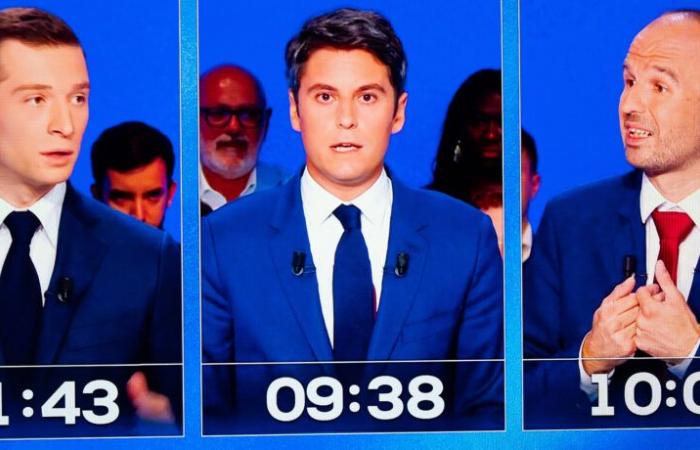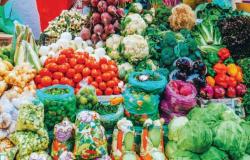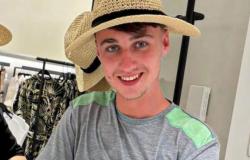Three days before the first round of the legislative elections, the National Rally seems to be largely winning with 36% of voting intentions, according to a survey conducted from June 21 to 24 by Ipsos for Le Monde, the Jean Jaurès Foundation, Cevipof, the Montaigne Institute, Radio France and France Télévisions. In second place, the New Popular Front totals 29% of voting intentions, ten points ahead of the coalition led by the presidential party.
Scores very different from those of the 2022 legislative elections, where the presidential majority – admittedly relative – came first in the first round with more than 25% of the votes. The left, already united two years ago under the banner of Nupes, progressed by three points in voting intentions in the first round.
Very mobilized RN voters, facing a weakened “republican barrier”
The progression is all the more significant on the side of the National Rally, which had collected a little more than 18% of the votes in 2022. Less than a month after the European elections, Jordan Bardella’s electorate remains very mobilized. The far right even gained a few points compared to the June 9 vote, with 4% of voters indicating their wish to vote for an LR candidate allied with the RN in the first round of the legislative elections.
Emmanuel Macron’s gamble, to dissolve in order to remobilize his camp after a vote to let off steam against the government in the European elections, thus seems to be a losing one. Because according to the Ipsos electoral survey, 56% of RN supporters voted above all for the party list “out of support for the values and ideas” that it defends, against 42% “out of a desire to punish the power in place”.
The reflex of blocking the vote against the National Rally also seems to be weakening. Among those polled saying they voted in the first round primarily to “block other candidates”, 69% say they want to prevent the victory of the RN but almost as many – 63% – say they want to block the way for a candidate from the New Popular Front .
44% of right-wing voters are still unsure about their vote
The victory of the RN thus seems largely acquired. This is in any case the majority opinion of those surveyed, 60% of whom predict the arrival of the party in the lead on the evening of the second round, for two thirds of them however their score will not be sufficient to obtain the majority absolute seats.
Given this observation, these legislative elections still have their share of uncertainties, particularly regarding the voting intentions of right-wing voters. Marked by the explosion of their political family, 44% of them say that their choice for this first round is not yet final. A figure twice as high as the average of those surveyed.
The Ipsos study also debunks the argument defended by Éric Ciotti, according to which the majority of his party’s supporters would defend his alliance with Jordan Bardella: 53% of those surveyed who say they are close to the Republicans disapprove of this agreement.
A New Popular Front generally supported on the left, despite the reluctance of certain socialist voters
Among left-wing supporters, the alliance formed by the New Popular Front has much greater support: 95% of those close to La France Insoumise approve of the agreement, a figure which still falls to 72% among those close to the Socialist Party.
If 84% of potential voters of the New Popular Front say they are sure of their intention to vote for the union of the left in the first round, some loss of votes remains to be expected among PS sympathizers. If the coalition candidate in their constituency is an elected official from La France insoumise, only 65% of those close to the PS say they would vote for him.
Unlike the National Rally, the left is struggling to mobilize its entire potential electorate. The voters of Raphaël Glucksmann, who led his list in third position in the European elections and followed closely behind the Renaissance list, are thus 16% to affirm that they will vote for the candidate of the presidential party in their constituency. The figure even rises to 17% when we question those who voted for the ecologist Yannick Jadot in the first round of the 2022 presidential election.
56% of French people reject the decision to dissolve
One thing, however, seems to bring voters together: the President of the Republic’s decision to dissolve the National Assembly is generally poorly received. 56% of them express “a negative feeling”, divided between incomprehension for the majority of them (26%), fear (21%) and anger (9%).
Unsurprisingly, only supporters of the National Rally say they are mostly in favour (75%) of this dissolution. Even those close to the presidential party struggle to understand Emmanuel Macron’s choice, with 58% disapproving of it.
Despite the rejection of the president’s decision, the vote is expected to mobilize voters in a historic way. Between 61 and 65% of those surveyed say they intend to go to the polls for this first round, while turnout was 47.5% in 2022, and 81% say they are “interested” in these elections. Another indicator of an unprecedented turnout: 410,000 French people living outside France voted online, a record, while the number of proxies more than doubled compared to 2022.






